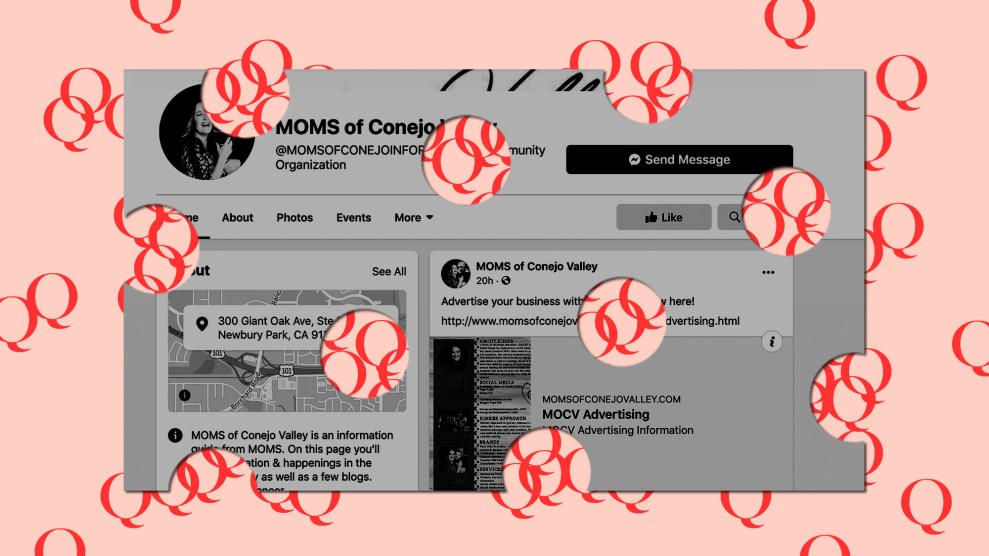
Mother Jones illustration; Getty
Chances are you have someone in your life—an aunt or a cousin or childhood friend or even just someone you once knew and still sometimes see at the grocery store—who doesn’t wear a mask. Maybe they’ve posted some false information online, or spoken out against masks, or stopped you to say hello in the frozen food section, bare-faced, and you’re left wondering, What do I do? What do I say? What can I say?
Figuring out how to handle this interaction became something of a mission for me recently—or more specifically, determining how to win an argument with an anti-masker: If rational people are presented with clear, compelling research, I naively assumed, their minds could be changed!
While vaccines are officially on their way, research shows masking continues to be one of the most essential and effective public health tools we have—particularly as people inevitably travel and mingle over holidays. The vast majority of Americans report wearing masks at least most of the time (and that number has increased since the start of the pandemic), yet about one in 10 Americans is still holding out, polls show.
But changing the mind of an anti-masker, it turns out, is not as simple as presenting research and a few statistics. In fact, after conversations with multiple experts—physicians, science communicators, behavioral scientists, and others—I realized I was thinking about it pretty much all wrong. These conversations are a delicate art; there’s a right—and a wrong—way to have them, as supported by science. If you want people to change their behavior, experts say, you’ll need empathy, curiosity, and time. Facts and statistics come later—much later. As Ashish Jha, a physician and dean of the Brown University School of Public Health, says, “I’m not so interested in winning arguments. I’m interested in helping people do things that are going to be better for them and their families.”
So instead of focusing on how to win an argument, I pivoted. I listened to what the experts had to say. The final result may be less sexy than what I originally had in mind, but after all, isn’t this what science is all about? Adapting to new information? Embracing being wrong? If I can squash my instinct to push up my glasses and declare, Well, actually, there is a robust body of evidence suggesting masks do work to prevent the spread of COVID-19!, we all can.
Here are the takeaways from my conversations:
Before speaking, actually listen to the other person.
The first step in any conversation about masks, says Abraar Karan, an internal medicine physician at Brigham and Women’s Hospital and Harvard Medical School, and a columnist at the British Medical Journal who has been outspoken on the issue of mask-wearing, is to “check yourself” and ask, “Can I actually empathize with how the other person is feeling?”
For instance, he says, can you empathize with the confusion caused by the fact that the CDC changed its initial guidance on masks? Can you empathize with the feeling that masks are uncomfortable? That wearing masks hasn’t traditionally been part of American culture? If you can’t see their point of view, he emphasizes, “you’re gonna lose. You’re gonna waste your time, you’re gonna waste time of other people, and your efforts would be better used on something else.”
Shaming someone or getting angry may actually make the pandemic worse, Karan says, because it causes people to dig their heels in deeper and could make them even less likely to wear masks or avoid other risky behaviors. “I think if everybody in this country became more kind, more empathetic, cared more about their neighbor, the epidemic would stop sooner,” he adds. “And we’d all be better for it.”
Research shows that if people feel “self-affirmed,” they’re more likely to accept new information, says Matthew Facciani, a social scientist and postdoctoral researcher at Vanderbilt University, who focuses on identity, politics, and polarization. It may boost “how they see themselves,” remove their “defensive barrier,” and in doing so, people may be “more open to identity-threatening information.” That’s why genuinely listening to the other person is so important.
“You definitely want to avoid making them feel defensive. You want to listen to their concerns with a non-judgmental stance, and try to validate their feelings and build trust,” he adds. “And you can do all this while still ultimately sticking to the facts. But when you’re first building this relationship, all those things are key.”
For Jha, he learned this lesson over many years of talking with anti-vaxxers. “When I was younger, with less gray hair, I often treated people who didn’t take vaccines with contempt: These people are anti-science and they’re being dumb. And I came to realize a) that’s not helpful framing, b) they’re not dumb. They’re actually perfectly smart. They’re often very good people.”
“The times that I have been really able to be able to shift people’s views,” he adds, “is when I have engaged them with respect—and not argue about those facts, but help them understand how I think about the problem.”
Have the facts in your back pocket, but keep them there—at least for a little bit.
“You want to try to resist the urge to start dumping facts on people,” says Facciani. Again, he urges, “You want to validate their feelings. I know it is kind of simple, but it’s so true.” Relying on straight logic can actually backfire. Our brains, generally speaking, operate qualitatively, not quantitatively, explains Dominique Brossard, a professor and chair in the Department of Life Sciences Communication at the University of Wisconsin, Madison, who focuses on risk communication. In short, that means we tend to think in terms of emotion, not numbers.
For example, Brossard says if someone hears “eight out of 10 people” will contract a disease, it feels like a greater risk than 80 out of 100, or 800 out of 1,000, or 80,000 out of 100,0000, and so on. Even if the number is the same, we react differently to it depending on how it is presented. Similarly, our emotions can get in the way even if the risk is low, Brossard says. Take, for instance, the case of vaccines: If you tell a mother that one out of a million children experienced a negative side effect of a vaccine, “You know what that mother is going to say? Oh, but that one [out of a million] may be my kid.” In this example, Brossard says, the driving force behind the mother’s decision not to vaccinate isn’t a number, but her emotional response to it.
In most cases, “the facts don’t convince anyone because they don’t relate to anybody,” Brossard says. “They don’t mean anything.”
That being said, in conversations with folks who are mask hesitant, Jha says you don’t have to ignore the data. “It’s not about persuasion through logic and facts. [But] logic and facts are important, right?” he says. “I do use data in my conversations, but I don’t lead with them. I lead with values, and I lead with what matters to people.”
Instead of the facts, frame the conversation around the person’s values.
According to the Moral Foundations Theory, a framework developed by behavioral scientists to understand “why morality varies so much across cultures,” there are five main moral values influencing our behavior: caring, fairness, loyalty, authority, and purity. In general, says Eugene Chan, an associate professor in the Division of Consumer Science at Purdue University whose research focuses on financial, political, and health decision-making, Democrats tend to adhere to the first two values: caring and fairness. Republicans, meanwhile, tend to find loyalty, authority, and purity most relevant.
Political ideology, of course, isn’t the only factor that may influence moral values. In April, Chan conducted a 1,033-person survey about wearing masks, social distancing, and staying home during the pandemic. He found a surprising driver of people’s values: age.
“What I found was that for people who are 30 years of age or younger, they actually care about the purity foundation: To them, it goes against human nature to wear a mask when you’re talking with someone,” he explains. “And to them, human beings are social people, they’re not supposed to be locked up inside their apartments or homes.” Older people largely cared about loyalty to others. “To stay at home means you’re not just protecting yourself, you’re protecting the whole community, the whole country.” The same was true about wearing masks and social distancing, he says: “You’re doing these for the welfare of the entire nation.”
Overall, the survey was evidence that people’s values can drastically differ due to a variety of factors—and if you’re approaching a conversation with an anti-masker, it is helpful to know where they’re coming from. “My findings would suggest,” Chan says, “that if you’re trying to talk to someone about these issues, you really need to understand their moral foundations. Why is it that you don’t wear a mask?”
Try to connect over a common identity.
As part of his PhD dissertation at the University of South Carolina, completed earlier this year, Facciani conducted a study in which he presented a few hundred Democrats and Republicans with a series of short, fictitious stories about bullying. Some of the stories reported that a Democrat carried out the bullying, and in others it reported that a Republican was the culprit. Facciani then asked participants how likely they were to believe the report was true. With no other context, Democrats tended to say it was more plausible that a Republican was the bully, and Republicans were more likely to say Democrats were the bully. Overall people tended to think their “group” was not the one conducting the negative behavior.
“The groups we identify with provide us with a sense of belonging and self-worth,” Facciani writes in a piece about his research in the Conversation, a nonprofit newsroom that publishes articles from academics. “Thus, if we identify with a political group, our psychological motivation is to process information in a way that supports the group we belong to.”
Put another way, information that affirms our identity as part of a group is typically easier for us to believe. This may be why, Facciani notes, Democrats are more likely to support mask-wearing than Republicans: At the start of the coronavirus pandemic, Democratic leaders largely embraced mask-wearing while Republican leaders, namely, the president, resisted it. By the same token, information that threatens our identity as part of a group may be easier to dismiss. “Whenever we challenge [someone’s] worldview,” Facciani says, “they can feel personally threatened. And so there’s this motivation to instead ignore that information that challenges their worldview and hold on to the beliefs that help them make sense of their social environments.”
So in a hyper-politicized mask debate, it can help to approach the conversation by establishing a common identity with the other person. Are you both parents? Christians? Forty-Niners fans? If you can frame a conversation about masks around a common identity, you can use the brain against itself, in a way. “With having this common identity, then you’re saying, ‘Oh, well, this person is more like me, I want to support my group,'” Facciani says.
Jha tells me about talking with a friend’s wife “who refuses to take vaccines and doesn’t get the flu shot, and really has lots of concerns about giving vaccines to her children.” He explains the way they eventually “made progress” was pretty simple if slow-moving: “I talked to her about how I thought about these issues for my family and understood why she was making the decisions for her family—both getting myself to see her perspective, trying to get her to see my perspective. And over time, she moved in terms of her own decision making.”
Know you probably aren’t going to change someone’s mind with one conversation.
So say you’ve gone through all these steps. You listened. You’ve empathized. You’ve framed the conversation around their values and a shared identity. Now what? The next step: repeat. “That’s the hard part of this, how do you persuade people?” Facciani says. “How do you change minds? Ultimately, it comes down to a lot of emotional work. And there’s no real shortcut.”
Brossard echoes Facciani, saying if you want to change people’s minds you have to do so incrementally. And remember: Some people are beyond convincing. “I pick my battles,” says Brossard. “If I know somebody is really set in their beliefs, at the end of the day, you’re not going to change the way people think.”









